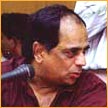
|
'Film quality bad, but TV gives wrong picture!'
AMPTPP head Pahlaj Nihalani's war against the media
|
Ronjita Kulkarni
The tussle between the media and the Association of Motion Pictures and Television Programme Producers (AMPTPP) continues. The latter claims the media is responsible for the poor box-office collections of films. The media points fingers at the poor quality of films today.
In recent times, only a handful of films have had good openings --- Vikram Bhatt's Awara Paagal Deewana, Abbas-Mustan's Humraaz and Sanjay Leela Bhansali's Devdas.
While the Shah Rukh Khan-Madhuri Dixit-Aishwarya Rai starrer Devdas received mixed reviews, the film has been declared a hit already. But this has not diluted the controversy, as the apex body of producers takes a more aggressive stand.
AMPTPP, headed by Talaash producer Pahlaj Nihalani, states that television ruins the box-office prospects of a film by predicting wrongly. "People do not get a chance to decide for themselves if they want to see a film," he says. "Television feeds them with everything, so even the curiosity dies down. They influence the people by giving them the wrong picture and that affects the box-office."
The success of Devdas in spite of mixed reviews does not daunt him. "When Ramesh Sippy's Sholay released in 1975, it got mixed reviews. People called it Cholay! But it became a blockbuster. The same goes for Aditya Chopra's Mohabbatein, Karan Johar's Kabhi Khushi Kabhie Gham and the recent Devdas. The reason why they did well was because they were big films and there was a lot of curiosity attached to it. Unfortunately, medium budget films do not enjoy this."
Nihalani mainly points fingers at television and radio, as the print media 'does not enjoy such a wide coverage'. Also, television airs film's software, which the producer gives them at no cost. The clips are aired repeatedly, reducing curiosity value. "The question is that if the media misuses our software, why should we supply it to them? We have to see our interests first, then others'."
With the entry of so many radio stations and new technology, the music industry has changed a lot. According to Nahalani, for the worse. "The radio stations air entire songs. They do not take permission nor give royalty to the music companies or producers. Now, if people like a song, they will simply record it, instead of buying the album. That affects our music sales."
Nihalani states that earlier, even bad films did business. Now that has long since stopped.
AMPTTP is also against reviews appearing in trade magazines. AMPTTP spokesperson Anil Nagrath stated that the reviews were very vicious and reviewers aimed at killing films. He hoped to take action against this issue. Nihalani does not mind reviews in trade magazines, but claims the media must not publicise these reviews. "Trade magazines are not meant for the public. They are the internal industry material to help exhibitors and distributors. We publish film figures in these magazines to help exhibitors and distributors buy the film. They serve as guides. The media should not take our internal information and circulate it."
Nihalani admits, "I do agree the content of the films has deteriorated. The Association will take adequate steps to ensure that the films improve. But frankly, directors, producers and actors determine the content. A director will only direct a film if he feels the content is worth it. It is creative freedom. Similarly, we cannot force actors to sign a film, if they do not want to. They sign only those films which they think are good. The producer invests so much money. Naturally, he would choose a good film."
Meanwhile, the Association is holding numerous meetings and hopes to arrive at a solution by this week.